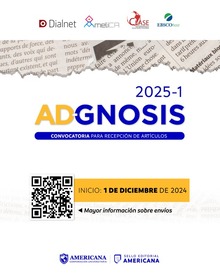Financial auditing and its impact on corporate profitability
DOI:
https://doi.org/10.21803/adgnosis.10.10.475Keywords:
Financial Audit, Profitability, Projection, CompanyAbstract
Currently, companies plan their activities in which
financial auditing is manifested as an instance for
companies to maintain a status through regulation,
which is evidence that good management is handled
in organization. However, many companies present
profitability projection problems, since they do not
apply an effective financial audit for the optimization
of resources and services in terms of obligations, sales
income, costs, expenses, operating activities, etc. This
causes the companies not to project their profitability
in the products, thus decreasing their production. The
methodology applied to develop the research is descriptive
with qualitative analysis, through which bibliographic
reviews were taken as the main instrument. The results
obtained indicate that the audit plans and programs
have an impact on the projection of the profitability
of the financial statements. It should be noted that
effective financial auditing makes companies to project
themselves at the national and international level and the
profitability of these companies is designated by means of
management, demonstrating the reliability and stability
of the stability of the project that the company undertakes.
It is important that companies should have internal
auditing units carrying out evaluations in order to timely
detect inconsistencies or weaknesses in the Systems.
Downloads
References
Arens, A. A., Loebbecke, J. K., Quiñones, A. D., González, F. R., & Bernal, F. J. C. (2007). Auditoría: un enfoque integral. Pearson educación. Consultado en línea en la Biblioteca Digital de Bogotá (https://www.bibliotecadigitaldebogota.gov.co/resources/2215194/)
Campos, M. (2012). Historia de la auditoría financiera. Recuperado de: http://miltoncamposcanizares.blogspot.com/2012/11/historia-de-la-auditoria-financiera.html
CONASEV. (1999). Reglamento de Información Financiera y el Manual de Preparación de Información Financiera. Recuperado de: http://www.oas.org/juridico/PDFs/mesicic3_per_rs103.pdf
Córdoba, M. (2012). Gestión Financiera. Décimo segunda (12) edición. 428 pág. Bogotá: ECOE Editores.
Contraloría de Colombia, C. P. (1943). Contraloría General de la República. Control Fiscal Participativo. Estrategias para la Promoción del Control Ciudadano a la Gestión pública, 1.
Del Estado, C. G. (2009). Contraloría General del Estado. Obtenido de Contraloría General del Estado.
Domínguez, P. (2000). Introducción a la gestión empresarial. B-EUMED.
Estupiñan Gaitán, R. (2004). Papeles de trabajo en la auditoría financiera. Bogotá. Eco Ediciones.
Estupiñán Gaitán, R. (2004). Papeles de trabajo en la auditoría financiera. ECOE Ediciones.
Revista Suma de Todos. (s/f). Las Proyecciones Financieras. Recuperado de: http://www.madrid.org/cs/StaticFiles/Emprendedores/Analisis_Riesgos/pages/pdf/proyecciones_financieras_es.pdf
Rivas, J. (2015). Área administrativa (Doctoral dissertation, Universidad Técnica Particular de Loja).
Rolón, F. y Sánchez, S. (2018). El teletrabajo: ¿una opción laboral acorde con las tendencias y exigencias del mercado o una figura con vacíos legislativos?. Dictamen Libre, 1(22), 91-104. https://doi.org/10.18041/2619-4244/dl.22.5030
Villegas, R., y Varela, R. (2001). Innovación empresarial: arte y ciencia en la creación de empresas. Pearson educación.
Yarasca, P. (2006). Auditoría: Fundamentos con un enfoque moderno-Fase del Proceso de la auditoría con aplicación de casos prácticos. Lima. Edición a cargo del Autor MVA Consultores y Auditores de Negocios (s/). La Importancia de la Auditoría Financiera en la Gestión de las Empresas. Recuperado de http://www. asociados. com. pe/publicación. php.0
Downloads
Published
Versions
- 2021-12-01 (2)
- 2021-12-01 (1)
Issue
Section
License
Copyright (c) 2021 ADGNOSIS

This work is licensed under a Creative Commons Attribution-NonCommercial-NoDerivatives 4.0 International License.






